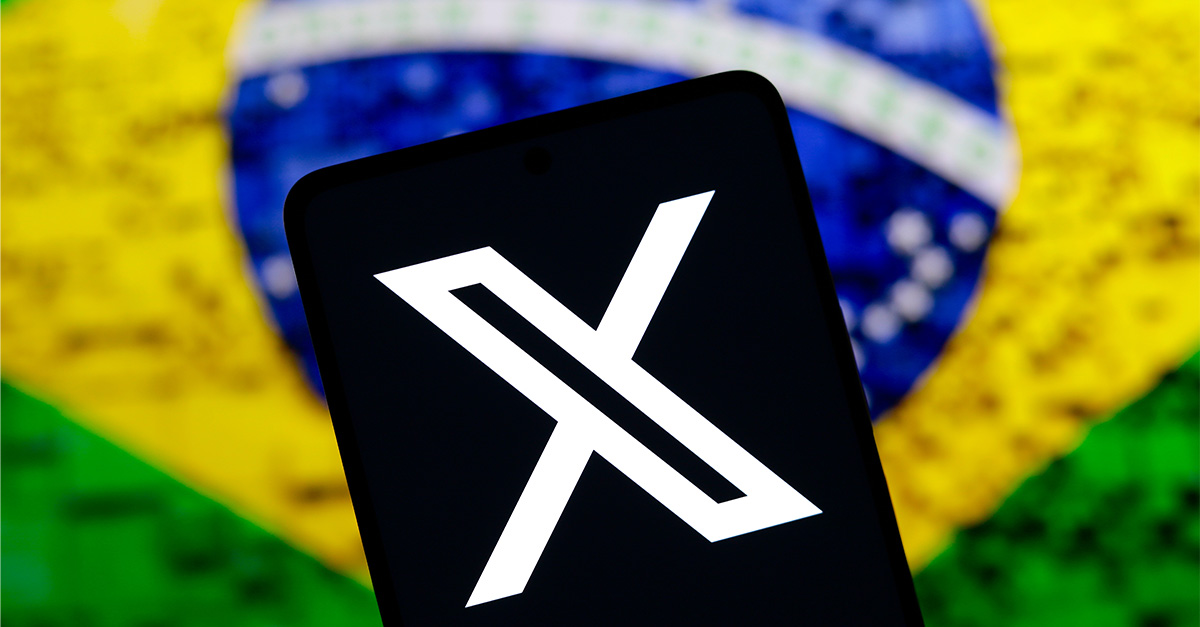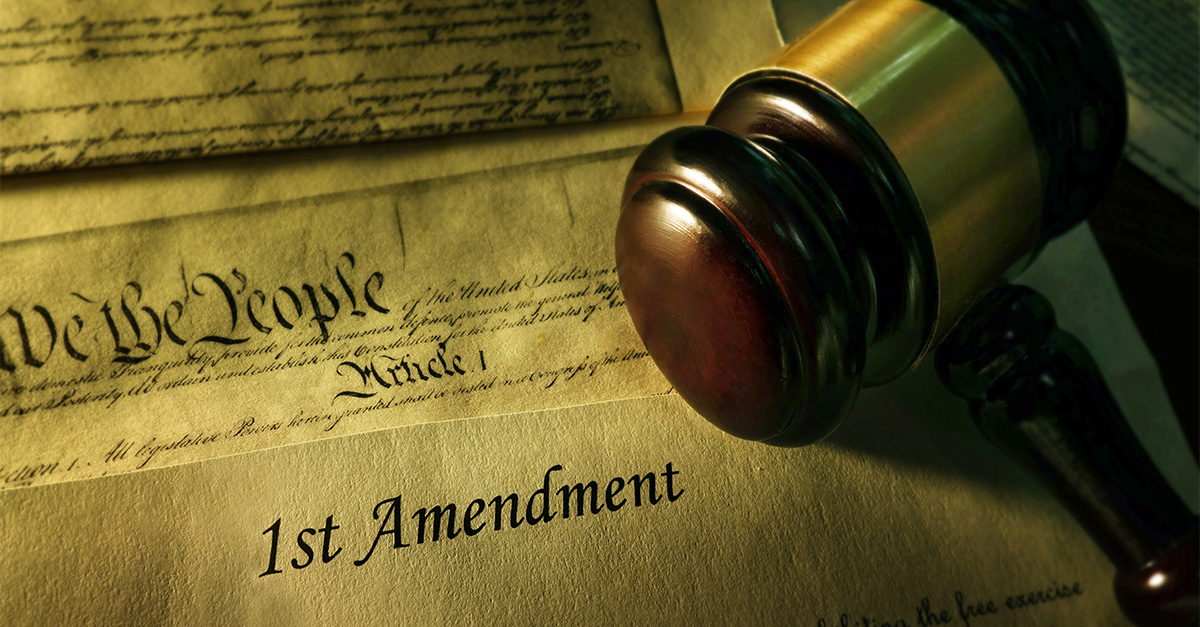


Get a free copy of Parental Rights & Education when you subscribe to our newsletter!

Why did the leaders of South America’s most populous country ban the social media platform X and criminalize accessing it? And why are some Americans celebrating such heavy-handed government censorship? Here’s an explainer.
In a watershed moment in the global battle over free speech, Brazil’s Supreme Court on Monday upheld a total ban on the social media platform X (formerly Twitter) that is owned by Elon Musk.
VPNs encrypt data transmission and provide anonymity and privacy to those who use it.
The country also froze the bank accounts of Starlink, a subsidiary of Musk’s Space-X that offers satellite-based Internet access to rural and remote areas around the world, including in Brazil.
This article will provide an explanation of what is happening in Brazil and why, and how it could add even more fuel to the censorship movement brewing in America and other nations around the globe.
Following the election of Marxist Luiz Inacio Lula da Silva in 2022 as Brazil’s president and the installation of his allies into the court system, the government demanded that X shut down accounts held by supporters of former President Jair Bolsonaro. These included a sitting senator and a 16-year-old girl.
The government claimed that the users were spreading fake news and election misinformation. It launched an investigation into “digital militias” it claimed were backing Bolsonaro.
Alexandre de Moraes, chief judge of Brazil’s Supreme Court, stepped in and ordered X to remove those accounts that he claimed were spreading misinformation and hateful content.
Musk has refused, claiming that Moraes is trying to force X to censor political opposition, which is against Brazilian law.
In recent months, the conflict has escalated.
Less than three weeks ago, Moraes said he would arrest X’s legal representative in the country if X did not shut down the accounts.
X’s Global Government Affairs account posted that Moraes had threatened the legal representative in a “secret order,” explaining,
“Despite our numerous appeals to the Supreme Court not being heard, the Brazilian public not being informed about these orders and our Brazilian staff having no responsibility or control over whether content is blocked on our platform, Moraes has chosen to threaten our staff in Brazil rather than respect the law or due process.
As a result, to protect the safety of our staff, we have made the decision to close our operation in Brazil, effective immediately.”
X had continued to provide access to users but no longer had Brazilian offices or a legal representative, which is in violation of Brazilian law.
Moraes then threatened to shut down the entire X platform in Brazil if Musk did not appoint a legal representative, to which the company replied,
“When we attempted to defend ourselves in court, Judge de Moraes threatened our Brazilian legal representative with imprisonment. Even after she resigned, he froze all of her bank accounts. Our challenges against his manifestly illegal actions were either dismissed or ignored. Judge de Moraes’ colleagues on the Supreme Court are either unwilling or unable to stand up to him.”
The company stated that it does not insist that all countries have the same free speech rights as in the United States, but explained, “The fundamental issue at stake here is that Judge de Moraes demands we break Brazil’s own laws. We simply won’t do that.”
The dispute became even more complicated when Moraes attempted to levy fines against Starlink, which provides satellite-based Internet access to schools, first responders, the Brazilian military, and Brazilians living in remote areas, including the Amazon, as a way to force X to comply. The judge then ordered banks to freeze Starlink’s bank accounts in order to cover the fines imposed on X, a move that makes it impossible for Starlink to conduct financial transactions in Brazil.
Starlink is an entirely separate company from X, and Musk only owns 40 percent of it.
In a statement posted to X on August 29, Starlink argued that making its shareholders responsible for X’s fines is illegal, stating that the order “was issued in secret and without affording Starlink any of the due process of law guaranteed by the Constitution of Brazil. We intend to address the matter legally.”
Following all of this, Moraes moved to ban X from operating in Brazil. On Monday, the rest of the Supreme Court unanimously upheld the ban. The court has since ordered the nation’s 20,000 Internet providers and app stores to block X.
As part of that order, any Brazilian who tries to access X using a VPN will face fines of nearly $9,000 a day.
Musk stated that Starlink will continue to provide Internet services to its 250,000 Brazilian users for free, since it cannot receive payment from users.
Starlink also originally planned to continue providing those users with the ability to access X, but yesterday it reversed course. The company explained in a post to X that “Regardless of the illegal treatment of Starlink in freezing our assets, we are complying with the order to block access to X in Brazil. We continue to pursue all legal avenues, as are others who agree that @alexandre’s recent orders violate the Brazilian constitution.”
Meanwhile, many users planned to defy the X ban but still protect themselves by downloading a Virtual Private Network (VPN). This software encrypts data and provides users with anonymity.
On Friday, after it was announced that X was being blocked, Brazilians began downloading VPNs, with usage increasing 469 percent in the first few hours and hitting 1,840 percent by the end of the weekend.
Chiara Castro of TechRadar Pro talked to staff at VPN companies, and they predicted that it will be challenging, though not impossible, for the government to enforce bans on X or track down violators.
Gabriele Racaityte-Krasauske, spokesperson for the VPN Surfshark, stated, “At the moment, it seems difficult to imagine how the Brazilian government’s proposed fines on people using VPNs to access X could be implemented from a technical standpoint. Especially considering that it is one of the first limitations of this kind in the history of internet restrictions.”
David Peterson, general manager of Proton VPN, said that his company does not log any user activity so it has no data to provide authorities.
Although Brazil is just one country, and an increasingly authoritarian one at that, its willingness to openly shut down one of the world’s largest social media platforms and criminalize dissenting speech is shocking and could embolden other governments to attempt to do the same.
Many leaders, both in Western democracies and the U.S., were already demanding that Musk give into censorship mandates and chastising him as an extremist for his views on free speech. Shockingly, some have called for Musk to be arrested on criminal charges, while others have called for X to be fined, heavily regulated, or banned in their own countries.
Brazilian leader da Silva, known as “Lula,” has had plenty of sharp remarks for Musk. Last week he went so far as to say Musk can’t “keep offending” leaders, raising the eyebrows of free speech proponents.
“Just because the guy has a lot of money doesn’t mean he can disrespect this [country],” Lula stated. “He is a citizen of America, he is not a citizen of the world. He cannot keep offending the presidents, the deputies, the senate, the Supreme Court…he has to respect the decision of the Supreme Court.”
On Monday, Lula said he hopes Brazil’s actions are an example to the rest of the world. “The world is not obliged to put up with Musk’s far-right ideology just because he is rich,” he said in an interview with CNN Brazil.
Jonathan Turley, a constitutional lawyer and free speech advocate, wrote that if Brazil is successful in its efforts to silence X, it could fuel the suppression of free speech in other countries.
“For the anti-free speech movement, Brazil is a key testing ground for where the movement is heading next,” Turley cautioned.
“European censors are arresting CEOs like Pavel Durov while threatening Elon Musk. However, it is Brazil that foreshadows the brave new world of censorship where entire nations will block access to sites committed to free speech values or unfettered news. If successful, the Brazilian model is likely to be replicated by other countries.”
That seems likely considering that the European Union has already reprimanded Musk for X’s refusal to censor users or speech it doesn’t like.

If Americans think the Constitution will safeguard them from those bent on censorship, they are sadly mistaken.
The U.S. government has been working to censor Americans and control information for some time, and there is clearly a penchant for silencing dissent and inconvenient facts among politicians.
Two years ago, former presidential candidate and Secretary of State Hillary Clinton petitioned the European Union to implement the Digital Services Act in order to censor social media users.
Just days ago, Robert Reich, who served as secretary of labor in the Clinton administration, wrote an opinion piece for The Guardian, wherein he insisted that Musk is “out of control” and unveiled a blueprint to “rein him in.” He urged customers to boycott Tesla, advertisers to boycott X, “regulators around the world” to arrest him, the federal government to cancel military contracts with Musk’s SpaceX, and the Federal Trade Commission to order Musk to “take down lies” or face a lawsuit.
Meanwhile, Minnesota’s Attorney General Keith Ellison posted on X: “obrigado Brasil!” or, translated, “Thank you Brazil!”
There is also an increasing desire among Americans to have speech regulated and censored. More than half (53 percent) of Americans surveyed now believe that the First Amendment goes too far in protecting free speech.
The government has already proven it is ready to oblige. The government has been censoring and blocking free speech for some time now. Just last week, Meta CEO Mark Zuckerberg wrote a letter admitting that the White House and FBI pressured the company to remove certain content they didn’t like. This coercion was rubber-stamped by the Supreme Court in June, a ruling that Reich cited as evidence that the federal government has the right to force social media companies to remove content.
Bear in mind that we aren’t talking about illegal content. We are talking about facts, statistics, political and medical opinions, news stories, memes, jokes — anything the government deems harmful to its own beliefs and its own agenda.
The movement to silence and criminalize dissent is growing across the world — from continental Europe and the U.K. to Canada and the United States to other countries in between. And as part of this, they’re not just taking down posts or blocking content. They’re seizing assets, arresting people, and threatening businesses and non-profits.
We expect such actions in Russia, China, and Iran — not in so-called “democracies” that have long celebrated and protected human rights and freedoms. Now, though, they’re quickly being taken over by leaders and bureaucrats that claim the power to police “disinformation” or speech that doesn’t meet their standards.
Brazil is well on its way to taking away freedom of expression and free access to information from its people. America had better wake up to the nefarious influences undermining our constitutional rights, or we’ll soon find ourselves in the exact same position.
If you like this article and other content that helps you apply a biblical worldview to today’s politics and culture, consider making a donation here.

Notifications